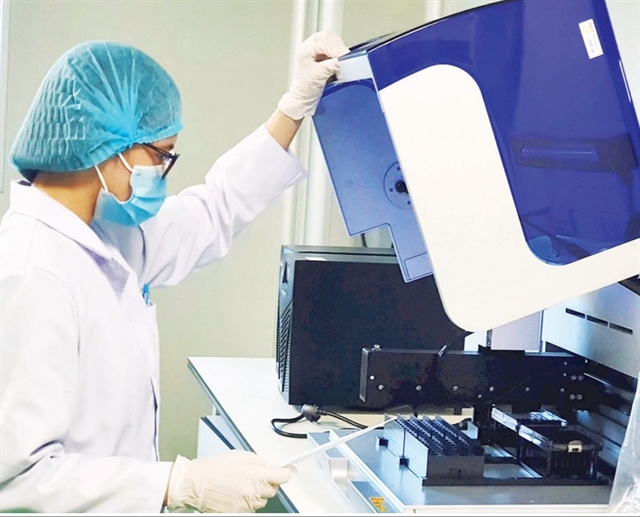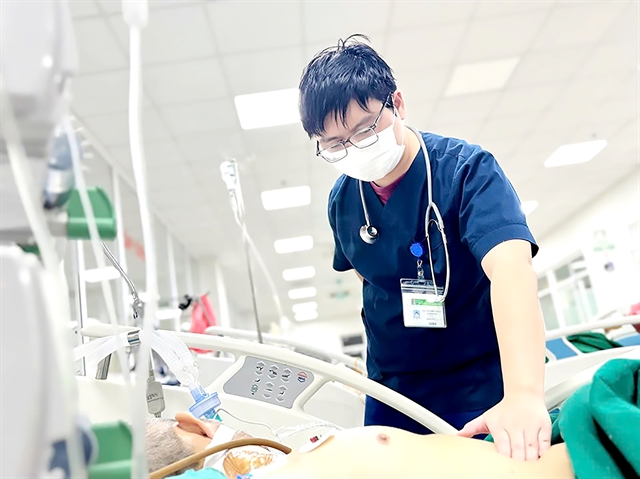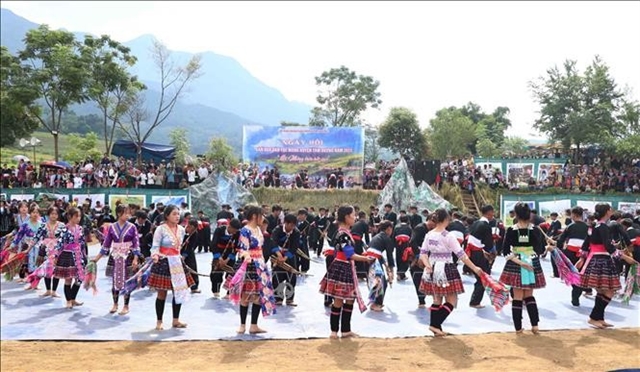 Society
Society

 |
| A doctor of the National Hospital for Tropical Diseases treats a patient with pneumonia. Photo courtesy of the hospital |
HÀ NỘI Cold weather in the north has sent many people to hospitals in recent weeks with infections with influenza, pneumonia, and bronchitis caused by bacteria and viruses.
Most of the patients are children, old people aged over 65 and those with weak immune systems and underlying diseases.
Many of them have been in severe conditions due to late hospitalisation.
The Emergency Department under the National Hospital for Tropical Diseases is treating nearly 20 pneumonia patients, including severe cases requiring ventilators and continuous blood filtration.
Pneumonia cases have been recorded in many different age groups, including the elderly, people with underlying diseases, immunocompromised patients and children.
A patient named T., 62 years old, from Hà Nội, was hospitalised with severe difficulty breathing, purple lips and suffering with blurred consciousness.
He has been living with chronic obstructive pulmonary disease (COPD) for more than ten years and takes a corticosteroid-containing inhaler at home without following regular treatment.
About a week ago, he came into contact with a relative with the flu and quickly developed symptoms of high fever and increasingly severe shortness of breath, accompanied by cough.
When admitted to the hospital, he was diagnosed with severe pneumonia, influenza A infection and Aspergillus infection - a serious consequence of prolonged corticosteroid abuse, severely weakening the immune system.
Upon the hospital admission, he was placed on a ventilator to maintain his breathing. Doctors also used broad-spectrum antibiotics to fight the infection and antifungal drugs to kill the lung fungus. After a week of intensive treatment, his condition has improved, but he still needs close monitoring to prevent complications.
Another patient N.V.T., 48 years old, from Thanh Hóa Province, was hospitalised in critical condition after three days of high fever, breathing difficulty and low blood pressure. He had a history of prolonged alcohol abuse, leading to cirrhosis, diagnosed three years ago, but did not receive regular treatment.
He was taken to a medical facility and diagnosed with pneumonia with septic shock. However, as his condition worsened, he was transferred to the Emergency Department at the National Hospital for Tropical Diseases.
He must undergo blood filtration to remove toxins and take strong antibiotics combined with circulatory support drugs.
Dr Trần Văn Bắc, deputy Head of the Emergency Department at the National Hospital for Tropical Diseases, said pneumonia is not only a common disease but also especially dangerous among people with underlying diseases or immunodeficiency. If not treated promptly, the disease might result in respiratory failure, sepsis and multiple organ damage.
Meanwhile, at the Central Lung Hospital, a 32-year-old patient with a history of good health and no underlying diseases was diagnosed with pneumonia after one-month-long coughing and chest pain.
Associate Professor Nguyễn Viết Nhung, former director of the Central Lung Hospital, said lung diseases are among the most common diseases during the cold season, and special attention should be p aid to preventing them.
The ageing of the lungs is evident as people age, so the older a person is, the more noticeable the alterations are. Elderly pneumonia symptoms are frequently hard to identify at first and are easily missed. When the disease becomes obvious, it is too late and difficult to treat, he said.
"Elderly lung conditions worsen more quickly than in young people; mild rhinopharyngitis can occasionally develop into bronchitis. Bronchitis in the elderly frequently lasts a long time, recurs easily, and develops into chronic illness," he said.
Some elderly people in good health can contract pneumonia simply by getting a cold. The illness advances quickly and results in respiratory failure, which manifests as breathing difficulties, shallow and rapid breathing, and a high pulse, he said.
According to Nhung, children under five have a weak immune system and react poorly to infections and other outside stimuli. In a similar vein, older adults' immunity and resistance are weakened as they age. Environmental factors, such as bacteria, viruses, and changes in temperature and weather, can quickly impact children and the elderly.
Young people who work outdoors for long periods of time, regularly drink alcohol, and shower late in cold weather might also get pneumonia, he said.
"Pneumonia is warned for all ages, in which the elderly are more susceptible to severe complications," he said.
To lower their risk of illness and complications, children under five, adults over 65 and people with underlying medical conditions or immunodeficiencies should have an annual influenza vaccination and a pneumococcal vaccine once in their lifetime.
According to the experts, people with underlying illnesses should adhere to their regular treatment plans and refrain from self-medicating, especially when using corticosteroids, as this can compromise their immune systems.
Associate Professor Trần Đắc Phu, senior adviser of the Việt Nam Centre for Public Health Emergency Response, said people shouldn't worry too much about the Human Metapneumovirus (HMPV) in China because scientists say these viruses are circulating annually. Việt Nam will keep an eye on World Health Organization news to respond and issue warnings appropriately.
Associate Professor Lê Thị Hồng Hanh, director of the Respiratory Centre at National Children's Hospital, said respiratory diseases often tend to increase in the winter-spring season. The hospital has so far not recorded any unusual fluctuations in the number of cases or their seriousness. There is now no vaccine or specific treatment for HMPV, so people are advised to take preventive measures by following the instructions. VNS




